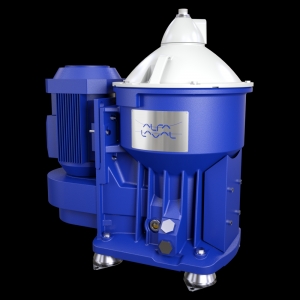


(Posted on 27/01/23)
Biofuels are a current and accessible fuel option that can help marine customers decarbonize. Yet while biofuels reduce CO2 footprint, they also pose new operational challenges. Alfa Laval is first in the market to address them with biofuel-optimized separators and separator upgrades.
Biofuels like HVO (hydrotreated vegetable oil) and FAME (fatty acid methyl ester) can be used by diesel engines without major engine modifications. They can be a carbon-neutral alternative if produced from the right biomass, but they must still be cleaned effectively to prevent performance issues and expensive engine wear. In a marine industry first, Alfa Laval high-speed separators are now compatible with HVO (EN15940) and with FAME (EN14214 or ASTM D6751) blends comprising residual fuel and/or distillate.
“We are proud to support our customers’ decarbonization journey, no matter which fuel path they take,” says Markus Hoffmann, Global Sales Manager, Marine Separation & Heat Transfer Equipment, Alfa Laval. “Biofuels will be the choice for many marine vessels, but customers must be certain that their equipment is prepared for them. With biofuel-ready separators and cost-efficient biofuel upgrades, Alfa Laval can provide that certainty.”
Biofuels are already in widespread use, and ISO is looking to incorporate them into the 2024 revision of ISO 8217. Nevertheless, they can be prepared in various ways and differ widely in their characteristics – both from conventional fuels and from each other. Because of differences in density, moisture absorption and more, they demand additional care when it comes to fuel storage and treatment.
To ensure optimal biofuel separation, Alfa Laval has modified both internal bowl components and the separator software. This makes setting up for HVO, FAME blends or conventional fuels a simple parameter change. Incorporated into new Alfa Laval separators for purchase, the developments are also available as upgrades for existing separators.
“Optimizing for biofuels is nothing that occurs overnight,” says Hoffmann. “Our biofuel-ready separators build on deep fuel insights, extensive research at the Alfa Laval Test & Training Centre and long cooperation with ISO and CIMAC. As biofuels continue to evolve, customers can count on Alfa Laval for efficient engine protection, just as they have with conventional marine fuels.”
Leading vessel performance platform Smart Ship Hub says the industry should expect a breakthrough year... Read more
The Nordic countries are taking an important step towards decarbonising maritime transport with the... Read more
Germany’s Steelpaint has appointed ADD Marine as its representative for Greece and Cyprus, strengthening... Read more
Rio Tinto’s first Pilbara-made iron ore rail car has rolled off the production line in Karratha... Read more
Precision meets progress at Phu My Port, Vietnam. The LPS 550 has been deployed to handle bulk commodities... Read more
bound4blue, a global leader in wind propulsion systems, has expanded its industrial footprint in Asia... Read more
As the industry explores multiple decarbonisation pathways, methanol is gaining attention as a practical... Read more
Technology group Wärtsilä will supply an integrated hybrid propulsion system for a bulk carrier... Read more
Superior Industries, Inc., a US-based manufacturer and global supplier of bulk material processing and... Read more
ESL Shipping has taken a significant step forward in digitalisation by deploying a new multichannel... Read more